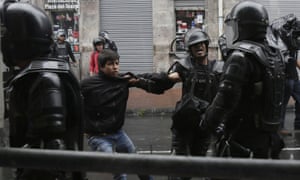Ecuador declares state of emergency as protesters decry end to fuel subsidies
Fiscal reform package sends demonstrators to the streets: ‘We’re paralyzing the nation’
REUTERS IN QUITO
Thursday 3 October 2019
Ecuador’s president, Lenín Moreno, has declared a state of emergency amid nationwide protests over the end of decades-old fuel subsidies in a government fiscal reform package worth more than $2bn a year.
“Down with the package!” protesters shouted, referring to measures that Moreno enacted this week which also included tax reforms.
As the fuel measure came into effect on Thursday, taxi, bus and truck drivers blocked streets in the highland capital, Quito, and the second city, Guayaquil, on the Pacific coast, while bus stations were closed. Indigenous groups, students and unions joined the protest, blocking roads with rocks and burning tires.
In Quito, masked demonstrators threw stones at riot police who responded with tear gas and deployed armored vehicles.
“It’s an indefinite action until the government overturns the decree on subsidies. We’re paralyzing the nation,” one bus transport leader, Abel Gómez, told Reuters.
Officials say the elimination of fuel subsidies was necessary to lift the economy and stop smuggling.
“To ensure citizens’ security and avoid chaos, I have ordered a national state of emergency,” he said of the measure that suspends some rights and empowers the military to keep order.
Some groups of protesters trying to reach the government palace in downtown Quito scuffled with police.
The interior minister, María Romo, said 19 people had been arrested for blocking roads and other offences.
Ecuador has a long history of political instability. Street protests toppled three presidents during economic turmoil in the decade before Correa took office in 2007.
The economy minister, Richard Martínez, said on Wednesday that Ecuador hoped that eliminating fuel subsidies and tax reforms could save the country about $2.27 bn a year.
The government wants to reduce the fiscal deficit from an estimated $3.6bn this year to under $1bn in 2020.
Ecuador’s debt grew under Correa, who endorsed Moreno in the 2017 election but has since become a critic of his successor’s turn toward more market-friendly economic policies.
Moreno’s government reached a $4.2bn deal with the International Monetary Fund (IMF) in February. But skepticism of the IMF runs strong in Ecuador and throughout Latin America, where many blame austerity policies for economic hardship.
“We’ll close all the main roads,” said taxi driver Sergio Menoscal, 55, helping to block streets in Guayaquil.
“We’re tired of false promises ... we can’t be blind to a government that has done nothing for the people.”






No comments:
Post a Comment